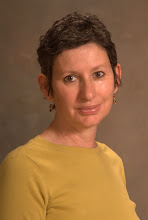I had a moment of clarity the other day. My husband Dennis and I went to see the radiation oncologist. Let's call him Dr. Rad. He was a somewhat thinner version of Barack Obama, with a nice smile and a warm manner. My background research also revealed that, in addition to his stellar medical credentials, he held a law degree from a top university. This was one smart guy.
After reviewing my medical records and completing a physical exam, Dr. Rad sat down with Dennis and me to talk about the close margin related to the DCIS, or the nagging pre-cancer problem. The conversation began innocently enough. Dr. Rad asked me to provide my understanding of my medical situation, and I succinctly laid out my case. He agreed that I was correct, and then he started to speak.
Slowly, the truth became evident. I was in a brave new world. In this land, no one approached problems like I did. These medical people were all analytical types, while I inhabit the other world, where creatures think intuitively.
The tip off was that Dr. Rad was laying out statistics and percentages, as if they had real value. Specifically, he said that he had just been to a conference where a case like mine was presented, in which a patient had clean margins around the tumor but close DCIS margins. Rather than re-excising, he said another approach was to increase the RAD dosage, which meant beaming more than the standard levels of radiation at me. At this point, he cited some probabilities and success rates. And then I was absolutely certain that I was no longer with my own kind, cognitively speaking.
Dennis, however, had perked up. A very analytical thinker, my husband appeared to be completely at ease and was offering his own thoughts and ideas. Meanwhile, I was curling inward a little and slipping down in my chair.
Granted, math is not my strong suit, and I admit that high school Algebra II got the better of me. I did manage a "B" in college statistics, however, so I do have the ability to do the analysis. But I just don't find the statistics very useful. Here's why: For purposes of discussion, let's say I stopped my treatment now. I could bet on the knowledge that I had no metastasis, that the surgeon removed the tumor with clean margins and, with luck, removed all the DCIS. Given that scenario, there is a chance that I may not have any recurrence. On the other hand, I could bet conservatively and elect to throw everything at this disease. I could have chemo, get radiated with higher doses, re-excise around the DCIS, and suppress my hormones. And yet, I might still suffer a recurrence. This all about betting, and I don't like Las Vegas.
Okay, okay, I hear you. The analytical readers are all protesting loudly and saying, if not by the odds, how does one make any medical decision? My answer is that I'm not sure. Maybe my problem -- or this could be my strength -- is that I always see the equation from a different angle. When Dr. Rad said that we could attack the margin problem with higher doses of radiation, my brain wasn't thinking about how much this improved my odds on the 10-year survival scale. Instead, my gut reaction was, "Can't we think of another medically sound approach that doesn't involve turning on the high beams?"
For me, the question is how will each component of the treatment interface with the other components. Specifically, how will the levels of radiation interact with the chemo (if it's prescribed), and how will the chemo interface with the hormone therapy, and how will the hormone suppressants affect the menopause situation, etcetera. It's not about how many thousand rads we're using, but about how the radiation piece contributes to the whole puzzle. It's the sum of the parts, baby.
Once the medical oncologist is on the team, my concerns here will probably diminish. I have a couple of consultations scheduled with oncologists in the weeks ahead, so the rest of December will be used to get a plan in order. I also understand that chemo precedes radiation, so the rad dosage discussion may be on hold anyway. In all honesty, I might have a different view about the statistical analysis, if I were not the patient. Since I'm the one who may be glowing, this is no longer an abstraction, but a high dose of reality.
Don't misunderstand. I'm most appreciative of this doctor's training and abilities, but someone has to have a holistic view. So as we proceed, my intuition is telling me to consider carefully all of the analysis and advice of the medical wizards, but also to finely tune my instinctive radar and not to discount its signals.
12/6/07
Subscribe to:
Post Comments (Atom)





No comments:
Post a Comment